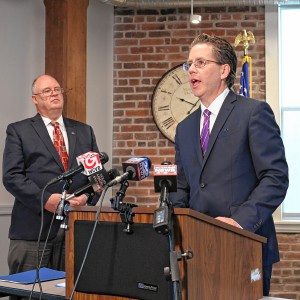As I See It: What if we could think like 10-year-olds?

Jon Huer
| Published: 04-20-2024 8:01 AM |
My wife, who is my severest critic, says I think like a 10-year old, which I interpret as a compliment. True, I tend to be simple-minded and linear as a 10-year-old child would be. After nearly half a century of working as a sociologist, writing a dozen books of social criticism, including “The Dead End,” prophesying America’s demise, which TIME magazine called “an important and brilliant book,” my style of thinking has not grown beyond the age of 10.
For example, when I read the introduction to the Declaration of Independence where it says, “All men are created equal,” I understand it literally. I read the words “all men” as literally “everybody.” I read the word “equal” and assume it means the logical opposite of “unequal.” To a simple-minded 10-year old, these words allow no other interpretations.
In such ways of thinking, I freely criticize my fellow Americans and our republic as falling short of perfection because Americans themselves aspired to be perfect and their environmental conditions were so perfect that the Puritan settlers called their new land “the Second Garden of Eden.” A 10-year-old asks: With such abundance and security, why could we not maintain a perfect republic and ourselves as perfectly behaving citizens in the New World?
By 10, as a metaphorical stage of life rather than a specific reckoning of years in human lifespan, we learn certain facts of life and basic beliefs about society, which form the building blocks of adulthood. At that age, we learn that, to live in society, we must work and to work we need to follow the moral and communal rules. Not yet tainted by the requirements of social survival, we can say the 10-year-old child is still at the ideal stage of simplicity and honesty in his life.
Trouble is that we must keep growing in the way our social environment requires: We must get schooled by the formal progressions of education. The simple-minded, honest 10-year olds must now start learning the “adult” way of thinking and living, which naturally includes compromising and abandoning much of their simple-minded idealism.
In grade school, we learn the basic facts and truths about life in simple terms, like “all men” and “equality” and that honest labor brings just rewards. When we go through middle and high schools, our learning adds certain community values and social practices, such as that hard work leads to success or practice makes perfect. We also learn that success inevitably risks failure, or that practice does not always make perfect, or that corporate strategy (with good advertisement) or personal luck (such as in lottery and inheritance) often trumps honest labor and just reward.
As we continue our learning in college, our knowledge becomes more sophisticated, increasingly distancing from the idealistic interpretations of “all men” or “equal.” In economics lectures, psychology classes, or history lessons, we learn to explain away why there are so many losers in our midst or those who suffer inequality, or those who succeed without really trying. Of course, all these advanced theories and sophisticated concepts deviate from what we held as 10-year-old simple minds. (As a stubborn 10-year old, I still can’t understand why “all men” doesn’t mean everybody, and “equal” doesn’t mean equality).
Forsaking our earlier idealism and adherence to truth as simple-minded 10-year olds, we all become corrupt adults and unjust citizens through our formal education to adjust to capitalist practices. In real life, we are constantly under pressure to be well-rounded team-players and loyal employees. It’s nearly impossible to see a generation of 10-year-old idealists to lead and shape our nation.
Article continues after...
Yesterday's Most Read Articles
 Orange Selectboard declares armory as surplus property
Orange Selectboard declares armory as surplus property
 DA to announce breakthrough in 1989 unsolved homicide
DA to announce breakthrough in 1989 unsolved homicide
 1989 homicide victim found in Warwick ID’d through genetic testing, but some mysteries remain
1989 homicide victim found in Warwick ID’d through genetic testing, but some mysteries remain
 Sportsman’s Corner: Orange Gun Club’s Kids Derby
Sportsman’s Corner: Orange Gun Club’s Kids Derby
 Carol Doucette of Royalston receives $15,000 from Publishers Clearing House
Carol Doucette of Royalston receives $15,000 from Publishers Clearing House
 Michelle Caruso: Questions candidate’s judgment after 1980s police training incident
Michelle Caruso: Questions candidate’s judgment after 1980s police training incident
As providence would have it, when the American Republic was established as the world’s first truly democratic nation, we had the good fortune of having a generation of 10-year-olds as our Founding Fathers. As 10-year-old idealists and enthusiastic believers in the perfectibility and innocence of human nature, our Founding Fathers simply created a nation for posterity where all would be equally treated as human beings.
They had just escaped from the feudal system where kings and lords unjustly ruled the peasants and commoners. As 10-year olds in their honest enthusiasm, with abundance of land and gun-secured equality for everyone in their new land, they literally and ideally believed that they could not expect anything less than a “perfect union” in this new republic. (The WWII generation was our other 10-year-old cohort).
But they did not anticipate the return of the Serpent to Eden, this time as capitalists, to tempt these new Americans — the 10-year-old founding generations — to become grownups.
As unlimited land closed and security was relegated to the professionalized military and police, such idealism and its benign reality were no more in America. Capitalism, which created a new breed of sophisticated men and women and built a completely different social-economic system, transformed most Americans into pliant adults and compromising citizens. It taught us to accept that it’s our nature to be corrupt and our society unjust, and that “all men” could mean “only a few,” or “equal” means “except those who fail,” and so on.
What would we tell our 10-year-olds if they innocently asked their parents why the Declaration of Independence declares “all men are created equal” but we have the world’s largest rich-poor gap? Very likely we would repeat the full lies and half-truths that our teachers and professors taught us to answer (or evading answering) these questions.
Sadly, the 10-year-olds among us must lose our idealist faith in America in order to live comfortably in a corrupt and unjust society.
Jon Huer, columnist for the Recorder and retired professor, lives in Greenfield.

